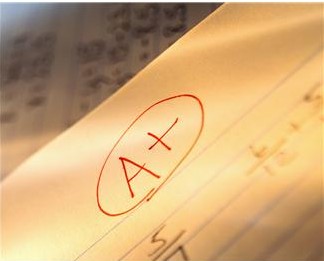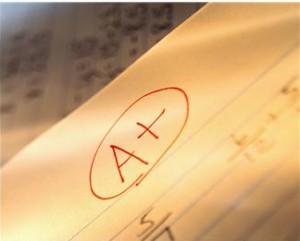
Last week found a dark cloud hanging over the educational establishment in Atlanta, Georgia. Caught up in the conspiracy to cheat were the former superintendent, executive administrators, principals, assistant principals, testing coordinators, teachers, school improvement specialists, and a school secretary at thirty-five schools— all were indicted on racketeering and corruption to various degrees. If the former superintendent is found guilty she could get a maximum of 45 years in prison.

While this event is a mockery of the once model school system, we can still hold them up an example for our children. Never miss an opportunity to teach your children about cheating, lying and stealing whether it is someone you know personally or someone you hear about through the media. It is important our children know and understand our values and what is expected of them. The people involved in this cheating scandal were as ordinary as you or I except they chose the wrong path.
How do you tell your children? Use age-appropriate language with enough information to get the point across:
Young children: “These people are not bad but they made very bad choices. In our family we like to make good decisions.”
Teens: “These people have been indicted on very serious charges and, if convicted, may go to prison for a long time. These people have brought shame on themselves and damaged their school system’s credibility.”
While you are on the subject, review your expectations concerning cheating and dishonesty. Here are a few random thoughts to consider:
• Focus on effort. Yes, even the best of us put too much focus on grades when we should care about effort. When children focus on effort rather than a grade it will help take the pressure off. If the effort is put forth, the knowledge— and grades— will come.
• Cheating is frowned upon under any circumstance, whether it’s a child taking a test or a parent trying to beat a red traffic light. Parents should model the behavior they expect from their children.
• If asked by another student to cheat, they should flatly refuse. Parents can be a child’s best excuse, “I’d like to help you cheat but my parents would kill me!”
• While taking a test, students should cover their answers with a paper or their arm. Children should keep their eyes on their own paper. Even looking around the room can be misconstrued as cheating.
• Kids should do their own work. Whether a test in class or a report due in a week, only by doing the work will kids gain knowledge.
• By choosing to cheat, a child is saying, “I am not good enough.” Even if a high grade is achieved, the child still knows deep down that they did not earn the grade. Even if they are not found out, there is a nagging fear of discovery.
• Child may get instant gratification of a higher grade but they know the grade or accolade was gotten through deceit. Self-esteem must take a blow.
• Think years ahead. Do I want to work in a building built by an architect who cheated their way through school? Do I want a doctor performing surgery on me when it was actually the parents who did their homework or project? Would I want to hire an employee if I knew they cheated their way through school?
• Don’t ask others to help you cheat. Asking a friend or another student to cheat is demeaning to them and lowers the cheater in their eyes. A real friend would not ask you to cheat.
• Never write a report and give it to another student who intends to claim the work as their own. It is still dishonest whether you get money for it or not. If someone promises to be your friend if you write a report or do a project for them you must understand it is still dishonest. You don’t want friends who expect something in return for friendship.
• Once labeled as a cheater, it will take a long time to rebuild their reputation and other people’s trust.
• When a child does not understand the material, they need to feel comfortable asking for help from parents, school mentors or peers. The Parents Anonymous motto is, “Asking for help is a sign of strength.”
• Doing your own work often ensures unique and original work that gets attention— and often better grades.
• Plan projects and reports so there will be enough time to finish them so there is no pressure to cheat.
• Consequences for cheating are not worth a one-time, artificially inflated grade. Parents may take away privileges as a consequence.
• Parents will probably be very disappointed with their child’s behavior if caught cheating.
Examples in Values and Character to Prompt Discussion
One weekend my daughter Chelsey spent an entire weekend in her room working on a report that was due on Monday. She took her meals in her room, only coming out for short bathroom breaks. Monday morning Chelsey waited with completed report in hand. Another student, whose mother I know well, came into class without anything on paper for his report. Chelsey watched him copy and paste other people’s work into a document from the internet. The boy got an A and Chelsey earned a C. Here are a few questions to ponder, with or without your children:
• Which do you think learned the material?
• What lesson did the boy learn?
• What did Chelsey learn?
• Who will go farther in life?
• Should Chelsey have reported the cheating she witnessed?
• Should I have reported the plagiarism I learned about from Chelsey?
• How do you think Chelsey and the boy (both now adults) feel about how they chose to handle the project?
• If Chelsey and the boy have children as adults, what do you think they will teach their children about cheating?
I am very interested in what you think. Let me hear from you!
Talk with a Volunteer or Find a Group in New Jersey:
Family Helpline
1-800-843-5437 or 1-800-THE-KIDS
Parents Anonymous® of New Jersey, Inc.
Phone: (609) 585-7666
Fax: (609) 585-7686
E-mail: PANJInfo@PAofNJ.org
Website: www.PA-of-NJ.org
Very apt.
# No doubt- Chelsey learned the material.
# Well- did the boy really learn any lesson? He needed to be counselled is what I believe.
# Chelsey might have learned to be more careful to make her own efforts remain private.
# I think so.
# Better to leave it to be solved by the teacher and kids.
#Chelsey must be feeling really proud she kept up the family values. As for the boy it depends- if he holds -“honesty’ as a life value -then he might be regretting for such an action even today!
# Chelsey would definitely share her experience of being honest- but the boy….. ??????
Hi Susan,
Thank you for your comments! You are probably right about many things. I know Chelsey does not have the burden of a secret like that to try to keep. She is also a very bright girl who has developed her studiousness over the years. I doubt the boy is concerned, what does concern me is whether his lack of knowledge and skills may one day hurt another. When I hear of a bridge or building falling, I always wonder why, that it might have been a child that cheated their way through school.
Thank you again for your knowlegable and thoughtful comments!
Jackie